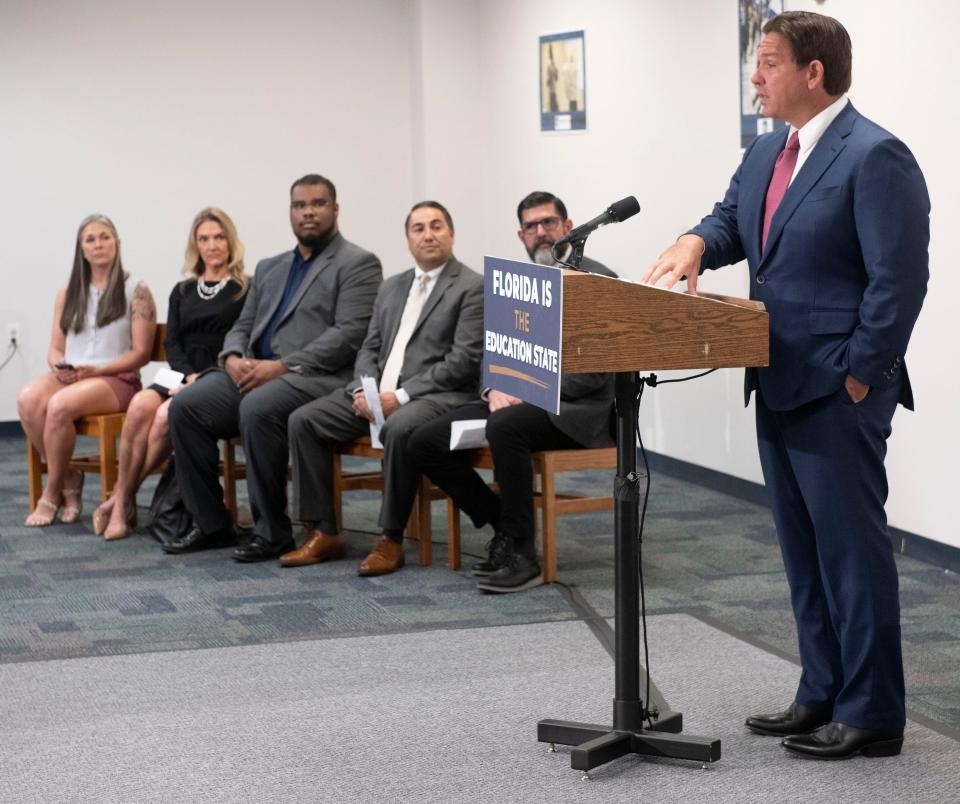In Pensacola, DeSantis touts bill limiting activists' ability to challenge school books
Editor's note: This story has been updated to report the bill was signed by Gov. Ron DeSantis on Tuesday.
Gov. Ron DeSantis on Tuesday signed an education bill aimed at expediting the process of turning around failing schools and limiting the ability of adults to dominate the book challenge process of a school district their children do not attend.
The day before signing the bill, DeSantis held a news conference at Warrington Preparatory Academy in Pensacola to highlight three impacts of HB 1285 on Florida schools, saying it provides a clear and concise process for a struggling school to convert to a charter school, restricts the amount of book challenges for residents without children in their school district, and adds Purple Star school districts in the state.

Expediting schools that are in turnaround status
DeSantis' said if a school district’s plan to turn a school around does not succeed, the pathway for the school to find new direction and leadership should be simple and efficient.
“We are really beefing up our turnaround school status,” DeSantis said.
DeSantis said the new bill will help to prevent situations like the one that occurred at Warring Middle School prior to its conversion to Warrington Preparatory Academy last year by giving school districts a stricter timeline to lock down a contract with a charter school company.
The middle school formerly known as Warrington Middle School under Escambia County Public Schools was taken over by charter company Charter Schools USA this school year, leaving the new company with under 60 days to renovate and prepare before the new school year. The school had a long history of failing grades under ECPS.
“This not something that happened easily,” DeSantis said of reopening the school as Warrington Preparatory Academy. “There was a lot of gnashing of teeth, there was a lot of dragging of feet.”
“It took forever to be able to do the charter contract,” DeSantis said.
Handing the school over was a point of tension for the Escambia County School Board, who were under pressure by the State Board of Education to lock down a contract.
DeSantis said it wasn’t until the salaries of school board members were jeopardized that they “changed their tune very quickly” and locked down the agreement.
Florida Department of Education Commissioner Manny Diaz Jr. faulted local leaders for the drawn-out process.
“I think the problem here is the responsibility falls solely on the Escambia School District for not only failing to reach the contract now, but it’s been a decade,” Diaz said during an Emergency State Board of Education teleconference last May. “The responsibility is not on this (state) board, it’s not on Charter Schools USA, it is on Escambia Public Schools.”
Charter Schools USA has been working to improve the performance of the middle school through structural and curriculum improvements, according to Charter Schools USA staff who spoke Monday.
DeSantis said the new bill will also ensure that students geographically zoned for the charter school will have priority access to the school once it is reopened.
“The kids that were not being served well are first in line to have a step up,” DeSantis said.
Residents without children in the school district will have book challenge restrictions
Under the new bill, residents that are not a parent or guardian to a child in their local school district would be limited to one book objection per month.
DeSantis said this will be an effort to prevent the book challenge process from being politicized by “activists” who are unnecessarily restricting books from students.
In Escambia County specifically, he said he has seen books under review that have been part of education for many, many years. He said he has also seen books that were covered up and unable to be checked out.
“That’s performative, that’s political,” DeSantis said.
Unlimited objections remain for parents with children in the school district, which includes homeschooled students accessing district materials.
DeSantis maintained that he is making an effort to keep pornography out of school libraries and said if a book is too sexually explicit to be read aloud or shown in a school board meeting, it should not be in schools.
While citizens can have an interest in education, the bill will prioritize parents, DeSantis said.
“It’s important that parents have a seat at the table,” DeSantis said.
DeSantis signed the legislation Tuesday during an appearance in Jacksonville where he said that objections about books came "from all ends of the political spectrum."
Reports last year, however, showed that in the first year of the new law out of the roughly 1,100 complaints recorded statewide, more than 700 came from two counties — Escambia and Clay, which represent less than 3% of the state’s total public school enrollment.
About 600 of the complaints came from two people — a Clay County dad and a Pensacola high school teacher. Both were political conservatives who lashed out at books they saw as morally ambiguous, promoting progressive ideals, or containing sexual content.
Purple star school districts would be recognized
The bill would also recognize “Purple Star School Districts,” which recognizes districts with Purple Star schools making up 75% of schools in their district.
Purple Star schools support the unique needs of miliary families and help ensure them a seamless transition into Florida by requiring schools to provide them with support and resources.
The Florida Purple Star School of Distinction designation was established by the Florida legislature in 2021, and schools maintain the distinction for three years. Purple Star schools support the unique needs of miliary families.
DeSantis said that the new designation would be an incentive for Florida schools to increase their number of Purple Star schools. It will also contribute to Florida’s military-friendly reputation, DeSantis said.
This article originally appeared on Pensacola News Journal: Florida Gov. Ron DeSantis visits Pensacola to talk HB 1285
